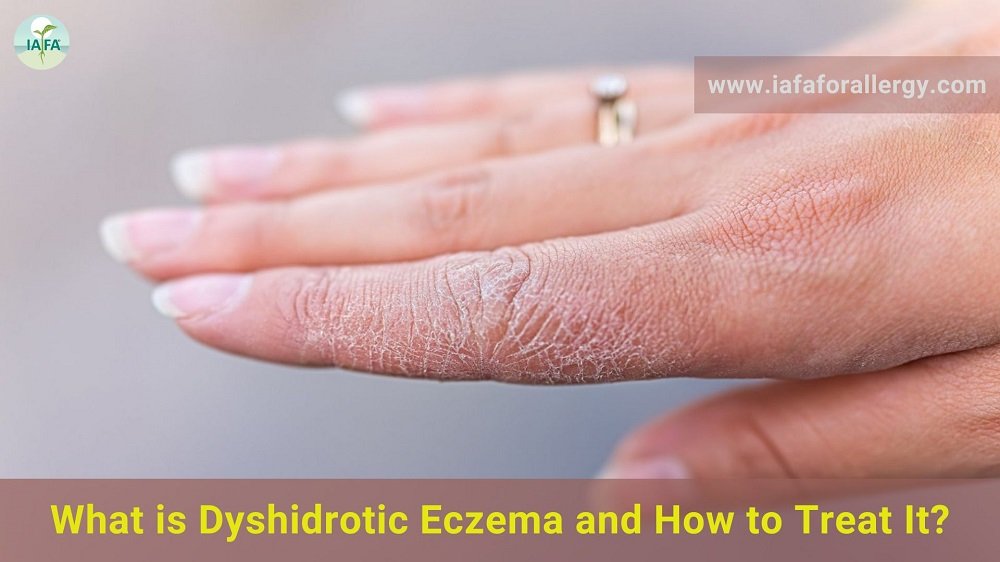Dyshidrotic eczema, also known as Pompholyx or Dyshidrosis, is a seasonal skin disease appearing as itchy blisters on the tips of fingers, palms, toes, and soles of feet.
Dyshidrotic Eczema usually happens in teenagers and adults. Dyshidrotic Eczema can be acute, recurring, or chronic. The Eczema typically appears in groups.
You can find fluid-filled blisters quite irritating. These blisters often last for two to four weeks.
You can also suffer from Dyshidrotic eczema blisters because of stress or seasonal allergies. Other factors like allergry from a costume jewelry can also cause dyshidrotic eczema.
In Ayurveda, the health of your stomach, lungs, and skin is closely linked.
Pompholyx eczema often goes hand-in-hand with seasonal allergies, and Ayurveda offers a deep understanding of how the condition develops and what triggers it.
Symptoms of Dyshidrotic Eczema
Primary symptom of dyshidrotic eczema is the tiny, itchy blisters. Other indications are –
- Thickening and varying in color of nails.
- Blisters close to sweaty skin.
- Blisters on your fingers, toes, palms, and foot soles edges.
- Redness on the skin.
- Itching or a burning discomfort before blisters occur.
Causes of Dyshidrotic Eczema
Some of the things that can cause Dyshidrotic or Pompholyx Eczema are:
- Anxiety
- Touch with metals like cobalt and nickel
- Sweaty or moist hands and feet
- Warm, moist weather
- HIV disease
- Specific therapies for a vulnerable immune system (immunoglobulin)
- Seasonal allergies
Dyshidrotic Eczema Treatment in Ayurveda
In Ayurveda, most skin problems occur from an aggravated pitta dosha, which is linked to excess heat in your body.
You can avoid foods that generate heat to aggravate the pitta dosha. Heat-producing foods are –
- Spicy foods – chili peppers, black pepper, mustard seeds
- Sour foods – pickles, tamarind, vinegar
- Excessive Salt – salty snacks, processed chips
- Fried stuff – deep-fried snacks, pakoras, samosas
- Red meat – mutton
- Fermented foods – alcohol, kombucha
- Excess caffeine – coffee, strong tea
Ayurvedic treatment focuses on cleansing the blood and tissues, with herbs playing a central role. These herbs not only purify the blood but also strengthen your immunity to manage Dyshidrosis effectively.

Herbs for Dyshidrotic Eczema are –
1. Dronapushpi (Leucas cephalotes)
Dronapushpi is rich in antioxidants that work wonders to eliminate dangerous free radicals from your body.
Dronapushpi’s antipruritic properties soothe itching.
Dronapushpi’s antibacterial properties also eliminate microorganisms, resulting in healing other symptoms such as patchy skin, psoriasis, eczema, acne, sunburn, and scabies.
2. Satyanashi (Argemone mexicana)
In Ayurveda, Satyanashi is referred to as a Rasayana that boosts stamina and strength.
You can treat skin-related issues successfully with Satyanashi.
You can utilize Satyanashi’s antibacterial qualities to cure various skin conditions including eczema.
3. Shirisha (Albizia lebbeck)
The anti-inflammatory and analgesic qualities of Shirisha are abundant.
You can make Shirisha’s paste and apply on your skin for treating wounds and similar skin conditions.
Shirisha detoxifies the skin and helps to improve skin tone.
The herb has antifungal, anti-protozoal, and antimicrobial qualities used to treat eczema, urticaria, eosinophilia, and other skin conditions.
You can also use the herb to cure various skin conditions like boils and itching.
4. Karanja Oil
Karanja has healing and antibacterial qualities that helps you treat skin conditions like eczema, abscesses, and boils.
You can make paste of Karanja leaves or get Karanja oil to directly apply on cuts and wounds.
5. Yashtimadhu (Glycyrrhiza glabra)
This mystical herb is frequently used to heal severe skin conditions like eczema, boils and oral thrush in babies.
In addition to treating numerous eczema symptoms like dry skin, skin irritations, and itching, Yashtimadhu also balances the Vata and pitta doshas to prevents the formation of eczema scars.
6. Coconut Oil and Sunflower Seed Oil
Excellent moisturizers for dry, eczema-affected skin are coconut oil and sunflower seed oil.
Sunflower oil helps repair the damaged epidermis layer, while coconut oil has wonderful antimicrobial capabilities that prevent infection.
You can apply these oils frequently to help with eczema symptoms such as itching, irritation, and hyperpigmentation.
7. IAFA E-5 Cell Repair Oil
You can effectively treat eczema and other skin conditions with IAFA E-5 Cell Repair Oil.
The oil contains herbs such as Karanj, Sirisha, and Darvi with skin-healing qualities, including antibacterial properties.
The oil treats eczema-related dry skin disorders and aids in repairing the skin barrier that has been compromised.
You can enhance your skin health with regular application of IAFA E-5 oil.
When to Consult with a Doctor to Treat Dyshidrotic Eczema
You must consult with an ayurvedic expert before using any herbs and herbal remedies.
You can also consult Dr. Gupta at IAFA® for complete treatment of Dyshidrotic Eczema.
Frequently Asked Questions
Q1. What herbs are most effective in Ayurvedic dyshidrotic eczema treatment at reducing inflammation?
Ans. Dronapushpi is the most crucial herb with strong antibacterial capabilities help in eliminating microorganisms from your body.
Satyanashi, Shirisha and Yashtimadhu are another potent herbs which are highly effective in curing Pompholyx Eczema.
Kajranga oil and Coconut oil is also helpful in treating eczema from outside.
Q2. How does Ayurveda explain the root cause of Dyshidrotic Eczema and manage it holistically?
Ans. Root casue of Dyshidrotic Eczema is imbalance of Pitta Dosha.
Other important factors are Prolonged stress, excessive sweating in hands, living in highly humid environment and coming in contact with metals like cobalt and nickel.
You can hollistcally treat Dyshidrotic Eczema by balancing pitta dosha in the body from inside alongwith using external herbal oils for quicker results.
Q3. What Ayurvedic therapies or practices have shown long-term remission for Dyshidrotic Eczema patients?
Ans. Herbal medicines, Abhayang with medicated oils, balanced diet and stress management through yoga and meditation.
Q4. Why are dosha imbalances considered the primary cause of Dyshidrotic Eczema in Ayurveda?
Ans. You can assume your body as a beautifully tuned guitar, having three doshas such as Vata, Pitta, Kapha, are like its strings.
If any of the string goes out of tune, the music output gets disturbed. In dyshidrotic eczema, it’s often an aggravated Pitta that creates the trouble.
Ayurveda focuses on tuning those strings, so your body’s natural melody returns.
Q5. How does Ayurvedic treatment compare with conventional methods in managing Dyshidrotic Eczema?
Ans. Conventional treatments often gives instant results but primarily focuses on supression of symptoms, whereas Ayurveda targets the root cause for lasting relief.
Q6. Which home remedies are most effective in soothing Dyshidrotic Eczema lesions?
Ans. You can use coconut oil and sunflower seed oil as home remedies to sooth Dyshidrotic Eczema lesions.
Where Sunflower oil, full in antioxidents and having antiseptic properties, repairs the damaged epidermis layer.
The coconut oil, on the other hand, has antimicrobial power that prevents infection. Both oils should be applied atleas 2 times a day to sooth the skin.
You can also use Aloe Vera gel on the eczema part which results in instant hydration and also posses antimicrobial properties that inhibits the infection from spreading.
Q7. How should I safely incorporate Aloe vera into my eczema routine?
Ans. Fresh aloevera is the best option.
You can slice the aloe leaf, scoop the gel, and patch-test it on a small area first.
If there’s no irritation after 24 hours, you can apply a thin layer on affected areas once or twice a day.
You can also mix it with a pinch of turmeric powder for better results.
You must avoid commercial gels with added perfumes or alcohol which can worse your eczema.
Q8. What are the risks of using Apple Cider Vinegar on sensitive skin during eczema flare-ups?
Ans. Apple Cider Vinegar being acidic in nature can casue burning sensation on the eczema patch.
You should avoid applying Apple Cider Vinegar on eczema.








